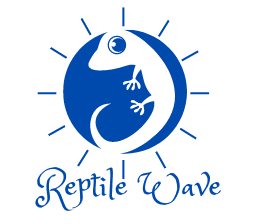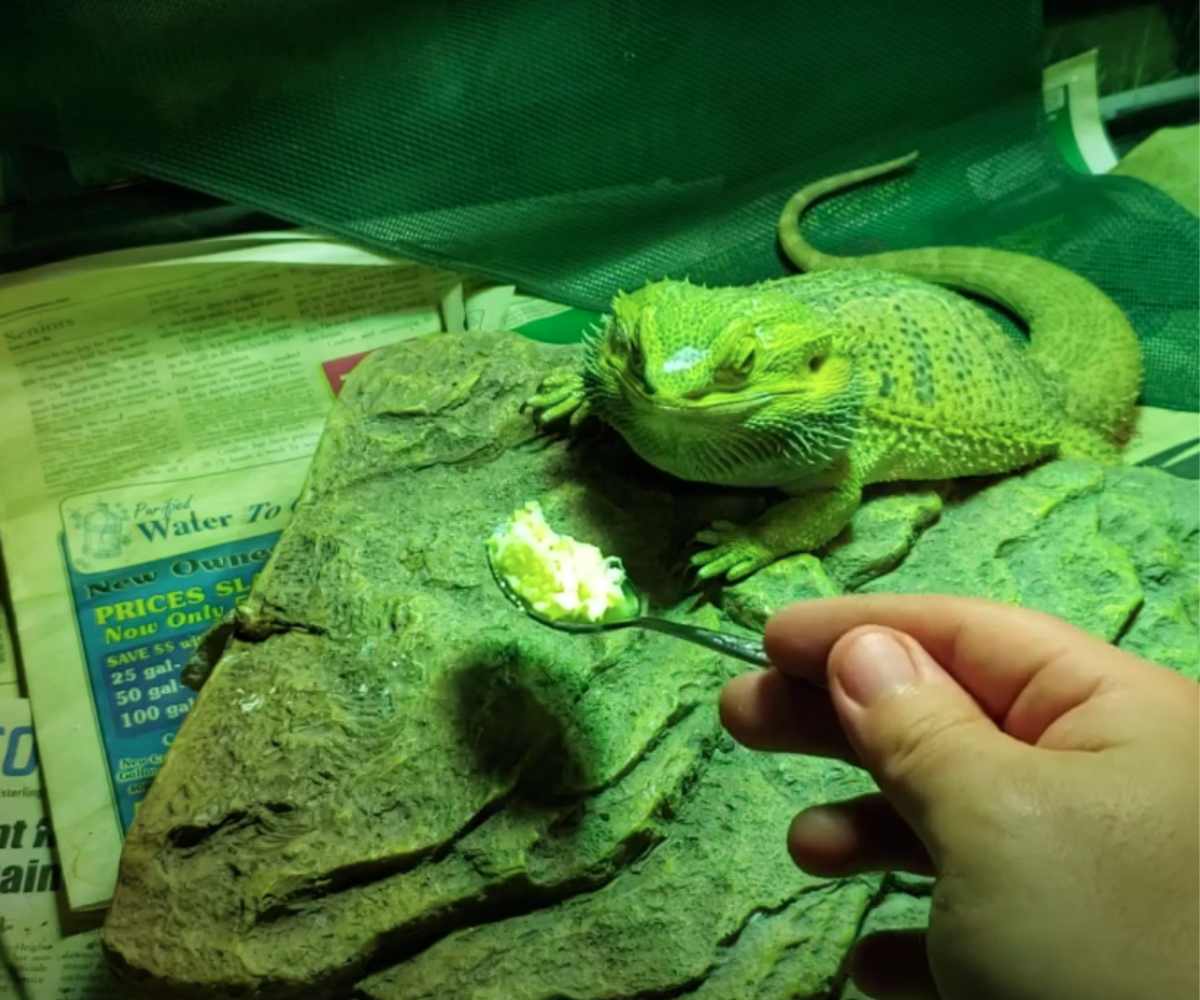As a bearded dragon owner, one of the first questions you might ask is, “Can bearded dragons eat cooked eggs?” Yes, they can. They can eat both boiled and scrambled eggs. But there are a few important things to consider before you add eggs to your bearded dragon’s diet.
Here are a few things to remember
- Bearded dragons can eat cooked eggs, but only as an occasional treat.
- Eggs are an excellent source of high-quality protein but should not be overfed.
- Always serve eggs in bite-sized pieces and avoid adding oils, butter, or seasonings.
- Eggs should be part of a balanced diet that includes greens, insects, and other staple foods.
In this post, I will cover everything you need to know about feeding cooked eggs to your pet.
Nutritional value of cooked eggs for bearded dragons
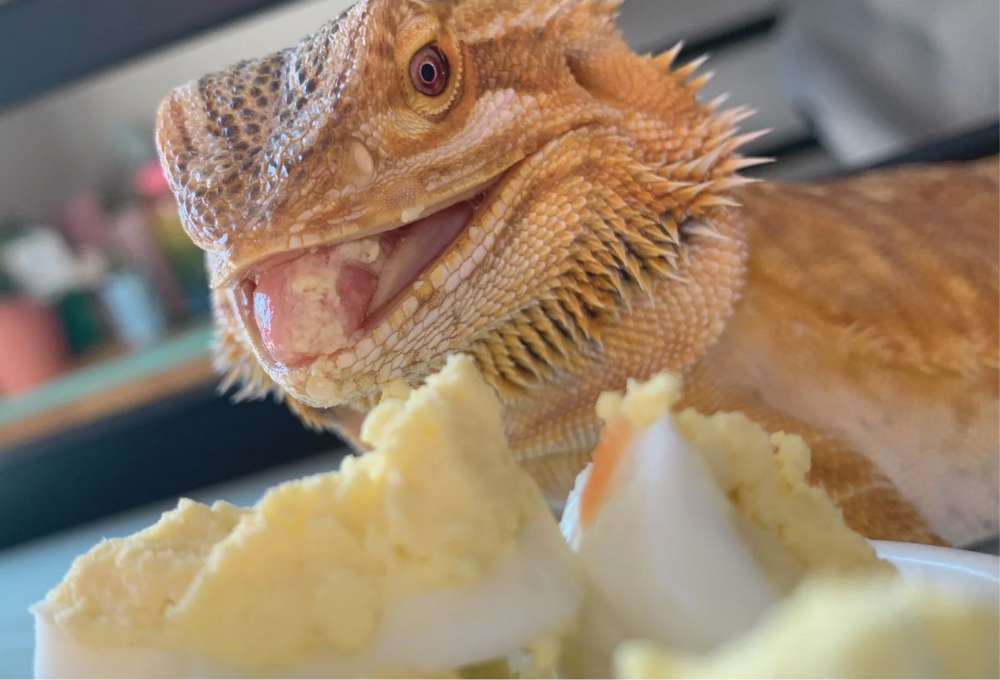
Eggs offer plenty of nutrition for your pet bearded dragon, but they should never replace their regular diet of staple foods like feeder insects and leafy greens. Let’s break down what makes eggs a suitable treat on occasion.
Vitamins in Eggs
First up, Vitamin A! Just like how carrots help with your eyesight, Vitamin A supports your bearded dragon’s vision and keeps their immune system strong.
Every egg provides about 6% of their daily need for Vitamin A, which is great for maintaining overall health.
Now, let’s talk about the B vitamins—there are a lot of them in eggs! Think of these vitamins as the power source for your dragon’s body.
They help with energy production and keep everything running smoothly.
Vitamins like B2 and B12 are important for bearded dragons, as they help with energy production, cell function, and overall health.
Vitamin D
Next up is Vitamin D, which is super important for your dragon’s bones. Vitamin D helps your beardie absorb calcium, which is critical for strong, healthy bones.
As bearded dragons need a lot of calcium to stay strong and active, Vitamin D is a big deal! It’s kind of like the glue that helps stick all the calcium where it’s needed.
Vitamin E and K
Don’t forget about Vitamin E and K! These two vitamins are like the behind-the-scenes crew making sure everything stays smooth.
They support healthy skin, bones, and help your beardie’s blood clot properly—super important if they ever get a little scrape or scratch.
Minerals
Eggs also bring a bunch of important minerals to the table. Think of these like the building blocks your dragon needs for strong bones and a healthy body.
There’s calcium, zinc, folate, selenium, and magnesium in every egg. Each of these minerals plays its own role in keeping your beardie healthy, but let’s zoom in on selenium for a second.
Selenium should be offered in small amounts because reptiles can be sensitive to trace minerals.
While selenium is vital for their immune function and metabolism, too much selenium can lead to toxicity, a condition known as selenosis.
Protein Levels
Cooked eggs are rich in proteins, with around 6-7 grams of protein per egg. This makes them a fantastic source of protein for your beardie.
Bearded dragons with protein-heavy diets can develop digestive issues over time.
Fat Content
Cooked eggs contain around 5.3 grams of fat per large egg, and about 1.6 grams of that is saturated fat.
While this isn’t a huge amount of fat for a human, it can add up quickly for a small reptile like a bearded dragon, especially if eggs are offered too often.
Again, egg yolks, while nutritious, also contain a high fat content, which can lead to weight gain and even fatty liver disease if overfed.
Feeding eggs once a week or less ensures that your dragon stays healthy without gaining excess weight.
How to Balance Fat in Your Bearded Dragon’s Diet?
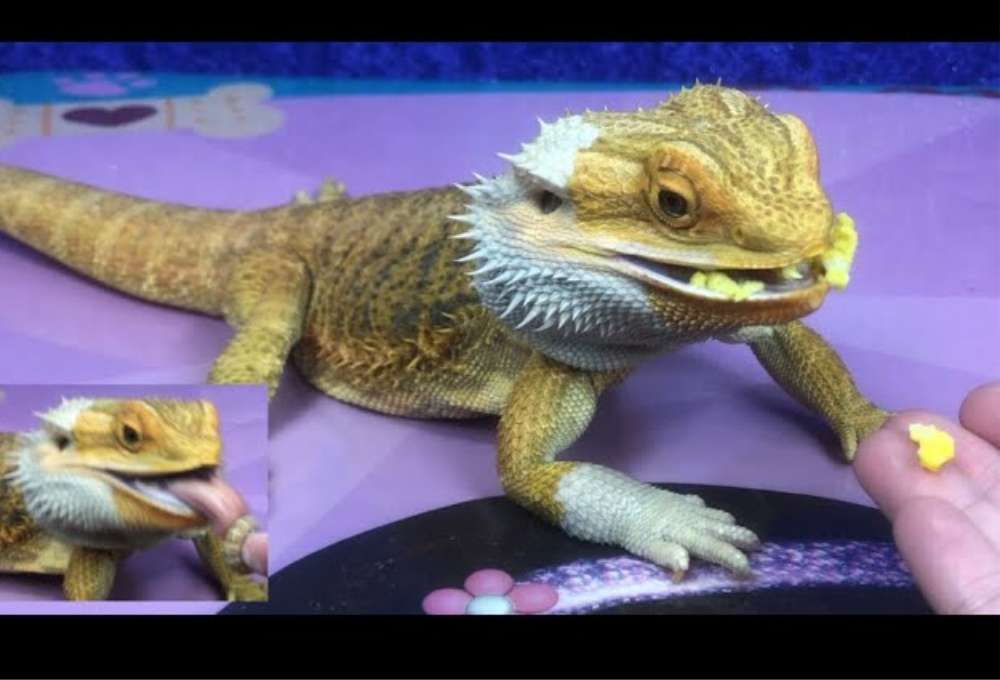
To protect your dragon from health issues, focus on a diet with low-fat leafy greens like collard greens, mustard greens, and vegetables.
Insects like dubia roaches or crickets can provide the necessary protein without being overly fatty. Eggs should only be an occasional treat due to their fat content.
A little bit of egg, like a teaspoon-sized portion, can be offered once a week or even less frequently to avoid loading your dragon with unnecessary fats.
| Age of Bearded Dragon | Recommended Fat Intake | Source of Fat |
| Juvenile | 15-20% of diet from fat | Mostly from feeder insects |
| Adult | 5-7% of diet from fat | Low-fat greens, occasional insects, minimal egg treats |
Comparison with the regular diet of a bearded dragon (vegetables, insects, etc.)
While eggs are a beneficial protein, they shouldn’t take the place of other foods in your dragon’s meals, like collard greens, feeder insects, and fruits. These are all essential for a varied diet that keeps your dragon healthy.
To help illustrate the nutritional differences between cooked eggs and a bearded dragon’s regular diet, here’s a handy comparison table
| Food | Protein | Fat Content | Fiber | Role in Diet | Frequency |
| Cooked Eggs | High | High | None | Treat or protein boost | Once every few weeks |
| Vegetables | Low | Low | High | Essential for vitamins and hydration | Daily |
| Insects | Moderate to High | Moderate | None | Primary protein source | Daily (more for juveniles) |
| Fruits | Low | Low to Moderate | Moderate | Vitamin and antioxidant source | Occasionally (due to sugar) |
Potential downsides of feeding cooked eggs
Even though cooked eggs can be a tasty treat for your bearded dragon, there are some things to watch out for if you feed them too much. Let’s talk about some of the problems that can happen.
Nutritional Imbalance
Eggs don’t have the right balance of nutrients for your bearded dragon. They don’t have enough calcium, and bearded dragons need a lot of calcium to keep their bones strong.
If they don’t get enough, they can get sick with something called metabolic bone disease (MBD), which makes their bones weak.
Eggs also have a lot of protein, which is good in small amounts. But too much protein can make your dragon fat and sick with things like obesity and fatty liver disease.
Your dragon should get most of its protein from insects like crickets, mealworms, and roaches, not from eggs.
Digestive Issues
Another problem with eggs is that they don’t have any fiber. Fiber helps your dragon’s tummy stay healthy and keeps them from getting constipated.
If your dragon doesn’t get enough fiber, they could have a hard time digesting their food. That’s why it’s important to make sure they eat plenty of greens and vegetables.
Also, if you give your dragon eggshells, they could cause a problem called impaction. This happens when sharp or hard things get stuck in their stomach and make them sick. It’s best not to feed them eggshells.
Unbalanced Calcium-to-Phosphorus Ratio
One of the most important nutritional considerations for bearded dragons is the calcium-to-phosphorus ratio in their diet.
Ideally, this ratio should be about 2:1, meaning twice as much calcium as phosphorus. Eggs, however, have a poor balance for reptiles
Eggs contain more phosphorus than calcium (about 86 mg of phosphorus and only 25 mg of calcium per egg).
This imbalance can prevent your bearded dragon from absorbing enough calcium, which is vital for bone health.
To avoid this issue, eggs should never replace calcium-rich foods in your dragon’s diet.
Always ensure your bearded dragon is getting plenty of leafy greens (like collard greens or kale) and, if needed, calcium supplements.
Cholesterol Content
Eggs are high in cholesterol, with around 212 mg per egg. While cholesterol doesn’t affect reptiles the same way it affects humans, bearded dragons don’t require cholesterol in their diet.
Over time, too much cholesterol could potentially lead to organ strain or other health complications.
Preference for Variety
If you feed your dragon too many eggs, they might miss out on other important foods they need to stay healthy.
Bearded dragons should eat a variety of foods, like greens, insects, and a little bit of fruit. This way, they get all the vitamins and minerals they need.
Eggs are okay sometimes, but don’t let them take over your dragon’s diet.
Can bearded dragons eat eggs raw?
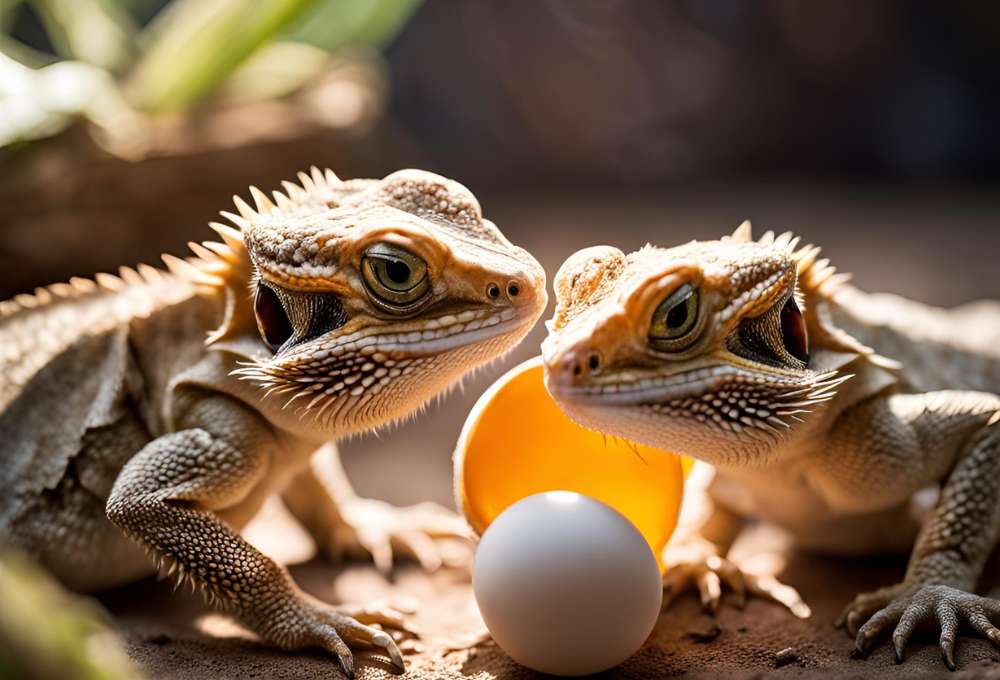
No, bearded dragons should not eat raw eggs. Feeding raw eggs to your dragon can be dangerous for several reasons
Risk of Bacterial Contamination
Raw eggs can contain harmful bacteria like Salmonella, which can make your beardie very sick. Cooking the egg kills any bacteria, making it safe for your dragon to eat.
Difficult to Digest
Raw eggs are harder for bearded dragons to digest. Their digestive system is not built to handle raw foods like eggs, and feeding raw eggs can lead to digestive issues such as upset stomach, diarrhea, or worse.
Biotin Deficiency Risk
Raw egg whites contain a protein called avidin, which can interfere with the absorption of biotin (a B vitamin that is important for healthy skin and metabolism). Cooking the eggs destroys this protein, making them safer for your dragon.
How can you cook eggs for bearded dragons?
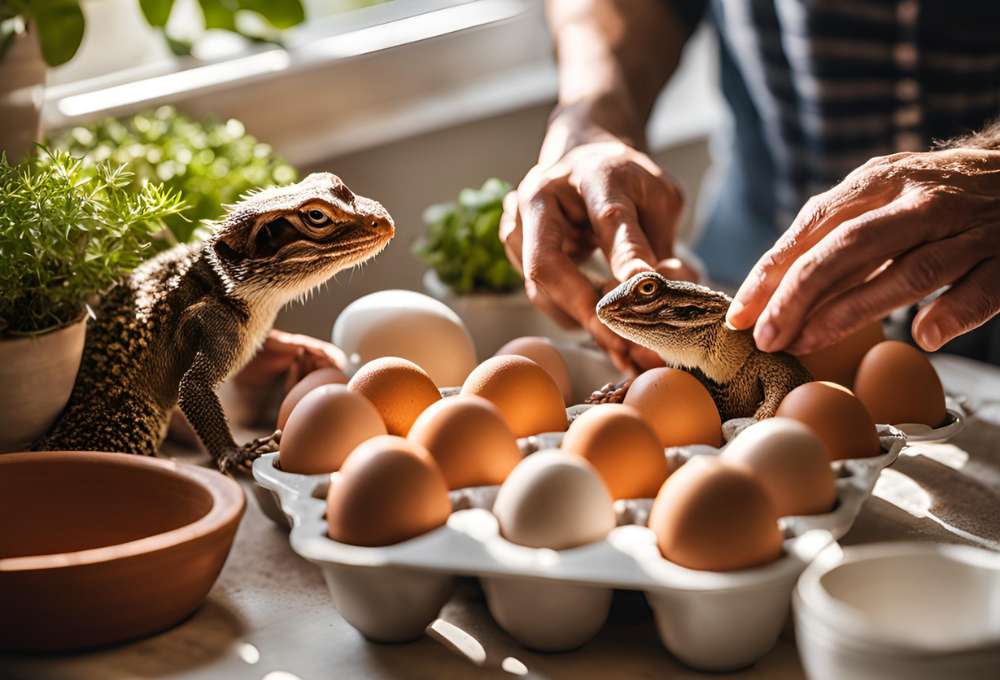
You have got a question in your mind “Is It Better to Feed My Bearded Dragon Boiled or Scrambled Eggs?” And you are thinking which cooking method you should go for.
You don’t have to worry! Both are safe options. Now come to the point how can you properly do that!
Cooking eggs for your bearded dragon is pretty simple, but you need to make sure you’re doing it safely. Here’s how to prepare eggs for your dragon in a way that keeps them healthy.
Boiled Eggs
The easiest way to cook eggs for your dragon is by boiling them. Here’s how:
- Place the egg in a pot of water and bring it to a boil.
- Let the egg boil for about 10 minutes to make sure it’s fully cooked.
- Once the egg is done, take it out of the water and let it cool down completely. You don’t want to give your dragon hot food!
- Peel off the eggshell, then cut the egg into small, bite-sized pieces. This makes it easy for your dragon to eat without choking.
Scrambled Eggs
You can also make scrambled eggs for your dragon, but you need to do it the right way:
- Crack the egg into a bowl and mix it up.
- Cook the egg in a pan without using any oil, butter, or seasonings. Bearded dragons can’t handle extra fats or spices, so the egg should be plain.
- Once the egg is fully cooked, let it cool down.
- Just like with boiled eggs, make sure to cut the scrambled egg into small manageable pieces so your dragon can eat it easily.
Can bearded dragons eat eggshells?
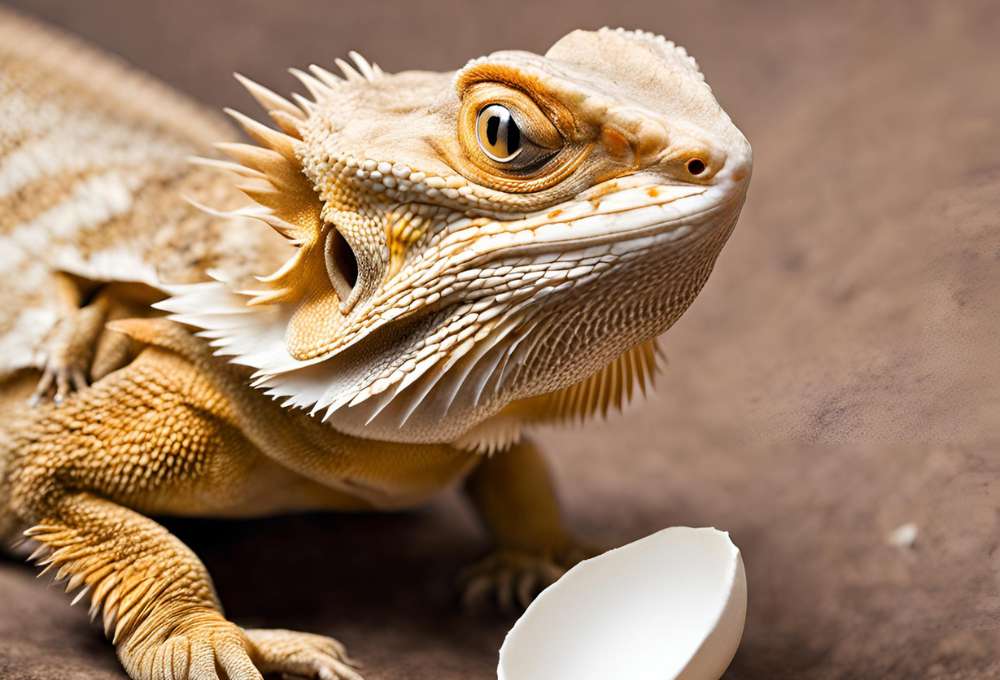
Yes, bearded dragons can eat eggshells, but you need to be very careful. Eggshells have a lot of calcium, which helps keep their bones strong and healthy. But you can’t just give them whole eggshells.
How to Feed Eggshells Safely
- Boil the eggshells. This kills any germs that might make your dragon sick.
- Grind the eggshells into powder. Never give your dragon big pieces of eggshell because it can get stuck in their stomach and cause a problem called impaction. You should crush the shells into a very fine powder.
- Once the eggshells are ground into powder, sprinkle a little bit over their regular food, like their greens or salad.
Can bearded dragons eat egg yolk?
Yes, bearded dragons can eat egg yolk, but it should only be in small amounts and as an occasional treat.
Egg yolk contains many nutrients, including protein and fat, but it also has a higher fat content.
Too much fat isn’t good for your bearded dragon and can lead to problems like obesity and digestive issues.
How to Serve Egg Yolk Safely
- Make sure the yolk is fully cooked, whether you are scrambling or boiling the egg. Never feed your dragon raw egg yolk because it can carry harmful bacteria.
- Only give your dragon a small portion of egg yolk, about the size of their head. Cut it into tiny, bite-sized pieces so it’s easy to eat.
What is the proper portion size of eggs for bearded dragons?
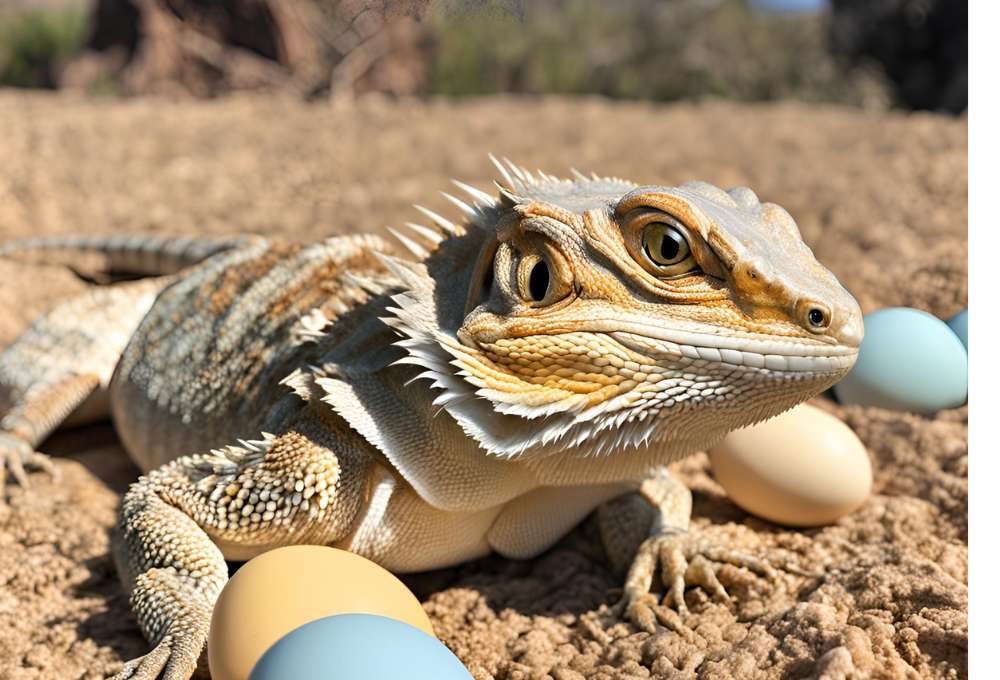
When feeding eggs to your bearded dragon, it’s important to give the right portion size to keep them healthy.
A good portion of cooked egg for your bearded dragon is about the size of their head. This means you should only give them a small amount at a time.
For example, after boiling or scrambling an egg, you should cut it into small, bite-sized pieces. You can give them one or two of these pieces, but don’t overdo it.
Can baby bearded dragons eat eggs?
Yes, baby bearded dragons can eat eggs, but it should be given very sparingly and only as an occasional treat.
Baby bearded dragons need a diet rich in protein and calcium to support their rapid growth, and most of their protein should come from insects like crickets or mealworms.
Can bearded dragons eat their own eggs?
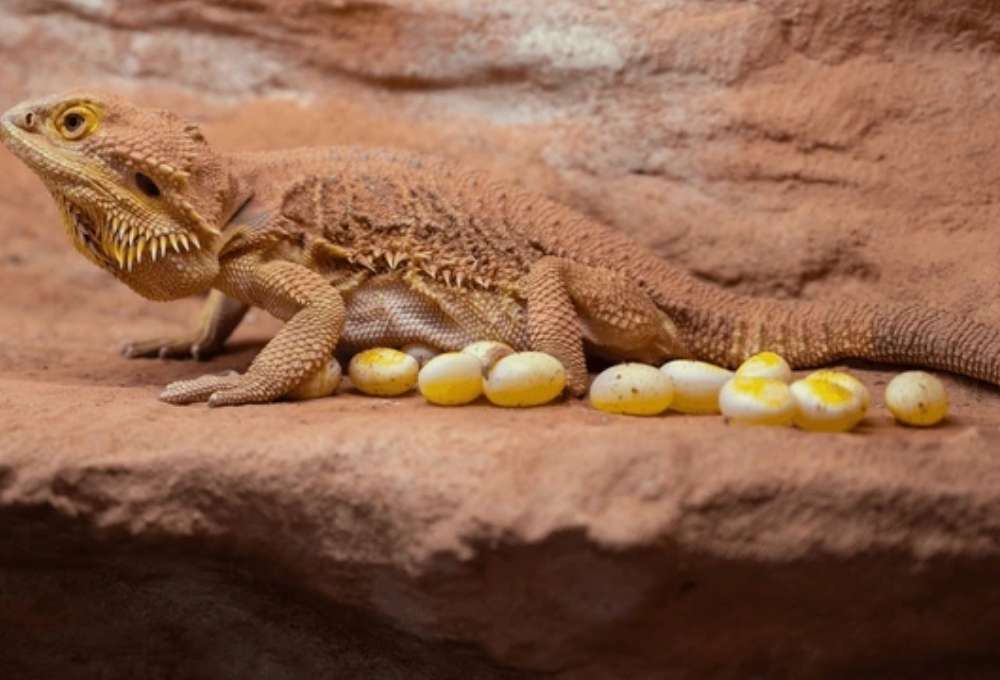
Yes, bearded dragons can eat their own eggs, a behavior known as oophagy. However, this is not very common and may suggest that something is wrong.
In the wild, female bearded dragons may eat their own eggs to survive. By eating the eggs, they can get back some of the nutrients they lost while laying them. It can also help hide the eggs and stop predators from finding their nesting sites.
Sometimes, a female dragon might eat her own eggs because she is stressed. Stress could come from poor living conditions, like a habitat that is too small, too cold, or not properly set up. If your dragon feels unsafe, she might eat the eggs to reduce stress.
If a bearded dragon is not getting enough nutrients from her food, she may eat her eggs to try to make up for the missing vitamins or proteins. This means her diet is not providing what she needs.
In some cases, a female might lay more eggs than she can handle. If she produces too many eggs, she might eat some of them because her body can’t support laying them all.
FAQ
Yes, bearded dragons can eat quail eggs and duck eggs, but just like chicken eggs, they should be given only in small amounts and on rare occasions
No, it’s perfectly fine if your bearded dragon refuses to eat eggs. Not all bearded dragons like eggs, and they can still maintain a healthy diet with their staple foods like leafy greens and insects.
Yes, they do. Cooked eggs can cause digestive issues like bloating or constipation if overfed. This is especially true for adult bearded dragons, who need less protein than juveniles.
No, you should avoid feeding fertilized eggs to bearded dragons. Stick to store-bought eggs that are unfertilized and fully cooked to avoid any health risks.
No, they don’t. While cooked eggs provide a protein boost, they should not be fed during brumation. During this resting phase, bearded dragons reduce their food intake, so focus on hydrating foods or water access instead.
Final thoughts
So, can bearded dragons eat cooked eggs? Absolutely, but here’s the catch—they should only have them every now and then. Think of eggs like a dessert for your bearded dragon: tasty, packed with protein and vitamins, but not something you serve every day.
Just like you wouldn’t eat ice cream for dinner, your beardie needs their main diet to be leafy greens, veggies, and insects. Cooked eggs are a fun treat—once a week or less. Make sure they’re fully cooked, cut into small pieces, and without any seasoning or oils. Simple, right?
By keeping eggs as a “special snack” and focusing on a balanced diet, you’re setting your bearded dragon up for a long, happy, and healthy life!
